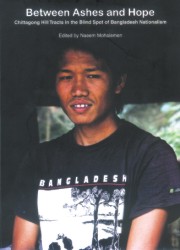| Book Review
Championing Pahari Rights
SAMYA KULLAB
 The case of the Chittagong Hill Tracts of Bangladesh remains a weighty topic amongst progressive thinkers, activists and journalists. The recent launch of Between Ashes and Hope: Chittagong Hill Tracts in the Blind Spot of Bangladesh Nationalism by Manusher Jonno Foundation and Drishtipat Writer's Collective is the most recent publication about the Chittagong Hill Tracts. The case of the Chittagong Hill Tracts of Bangladesh remains a weighty topic amongst progressive thinkers, activists and journalists. The recent launch of Between Ashes and Hope: Chittagong Hill Tracts in the Blind Spot of Bangladesh Nationalism by Manusher Jonno Foundation and Drishtipat Writer's Collective is the most recent publication about the Chittagong Hill Tracts.
The book was compiled as a response to the outbreak of ethnic violence in Baghaichhari last February. The incident served to summon back the issue of the unimplemented Peace Accord signed in 1997 and the continued marginalisation of the Pahari community to the national consciousness.
Perusing the 75 essays, some of them translated from Bangla, categorised under fourteen chapters, the reader becomes acquainted with a variety of issues plaguing the region. From the theoretical, such as nationalism, ethnic identity and colonisation, to the tangible, like the current status of the Accord, land rights and the general post-Accord situation. In all, the book brings to light a number of topics, some rarely discussed as public talking points.
Air Commodore's (Retd) Ishfaq Ilahi Choudhury has written one such essay titled Righting a Historic Wrong. At one point, Choudhury writes “Given some incentives, a sizeable proportion of Bengali settlers would prefer a return to the plains. Those who have nowhere to go may be moved to some of the industrial zones in the country and seek employment there.” Indeed, the Bengali Settler discourse is inadequately talked about in general debates about CHT and a serious scholarly analysis about the topic has yet to be conducted.
Another noteworthy quality about Between Ashes and Hope is that the book does not dwell, as the press often does, on the protracted security situation alone. Take for instance Zobaida Nasreen and Masahiko Togawa's Politics of Development that meticulously examines development efforts in CHT, concluding “the additional agenda embedded in development projects include dislocation and the intimidation of the indigenous community and entrenchment of strategic situation by forest clearing…” The linkage of the deteriorating ecological condition in the region to ongoing developmental programmes is another issue that is rarely brought to the fore.
By including writers of both Bengali and Adivasi origin, activists, scholars, military men and journalists, the reader is presented with a spectrum of voices. However, the anthology is by no means a comprehensive analysis of the land debate in CHT and according to the editorial collective, it was never meant to be.
Drishtipat Writers Collective worked on a voluntary basis to produce the book with the intention of giving the reader only a sense of the dominant themes. As the books editor Naeem Mohaiemen describes, the Collective wanted the book to be “easy to pick up”. For this reason, a book that could have easily surpassed 500 pages was compressed to less than 300.
Overall, though Between Ashes and Hopes will serve as an indispensable resource for those eager to know more about CHT, it has its shortcomings as well. Most palpable of them is the fact that it is written in English, triggering in Mohaiemen's words an “automatic pre-selection bias”. He describes the custom of English works about CHT to be overly academic and inhabiting the domain of NGO-based research. It is for this reason that many of the articles deal with issues such as gender and language. Though a Bangla language book would be more accessible to the masses the editorial collective insists that English language works are not as delimiting as they used to be.
The ideological orientation of the book is also hard to miss as progressive elements have often served as champions of Pahari rights. Mohaiemen provides structural reasons for this union, citing leftist political groups as the only ones to take up the Pahari cause during the 1980-90's. Moreover, as finding translators willing to work on a voluntary basis is an exacting task, the editorial team had to prioritise viewpoints and so the anthology lacks works exemplifying the anti-Accord stance.
Distribution of the book has been arranged by Manusher Jonno Foundation, with proceeds from sales going to Moanaghor, a school and orphanage for Pahari children in Rangamati.
Copyright
(R) thedailystar.net 2010 |
